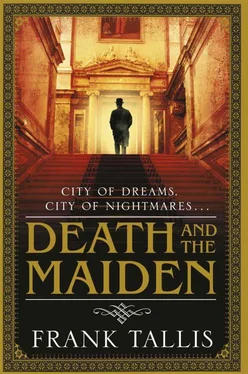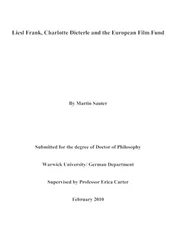Frank Tallis - Death And The Maiden
Здесь есть возможность читать онлайн «Frank Tallis - Death And The Maiden» весь текст электронной книги совершенно бесплатно (целиком полную версию без сокращений). В некоторых случаях можно слушать аудио, скачать через торрент в формате fb2 и присутствует краткое содержание. Жанр: Исторический детектив, на английском языке. Описание произведения, (предисловие) а так же отзывы посетителей доступны на портале библиотеки ЛибКат.
- Название:Death And The Maiden
- Автор:
- Жанр:
- Год:неизвестен
- ISBN:нет данных
- Рейтинг книги:5 / 5. Голосов: 1
-
Избранное:Добавить в избранное
- Отзывы:
-
Ваша оценка:
- 100
- 1
- 2
- 3
- 4
- 5
Death And The Maiden: краткое содержание, описание и аннотация
Предлагаем к чтению аннотацию, описание, краткое содержание или предисловие (зависит от того, что написал сам автор книги «Death And The Maiden»). Если вы не нашли необходимую информацию о книге — напишите в комментариях, мы постараемся отыскать её.
Death And The Maiden — читать онлайн бесплатно полную книгу (весь текст) целиком
Ниже представлен текст книги, разбитый по страницам. Система сохранения места последней прочитанной страницы, позволяет с удобством читать онлайн бесплатно книгу «Death And The Maiden», без необходимости каждый раз заново искать на чём Вы остановились. Поставьте закладку, и сможете в любой момент перейти на страницу, на которой закончили чтение.
Интервал:
Закладка:
Throwing the eiderdown off, he swung his legs out of bed and his feet made contact with the cold parquet. The bed itself was low and made of iron, a simple truckle bed and an absurdly modest piece of furniture in so large a room. Taking a deep breath, the emperor stood up and pulled the bell cord.
Within moments, a team of servants arrived carrying a rubber bath, which was subsequently filled with lukewarm water. The emperor was relieved of his nightshirt and one of the retainers, an ancient gentleman with a pronounced tremor, remained to perform such essential functions as passing the soap and scrubbing the emperor’s back. When His Majesty’s ablutions were finished, Ketterl, the valet de chambre , emerged silently from the shadows, ready to dress Franz-Josef, as he did every morning, in a military uniform. As soon as the emperor was fully accoutred, Ketterl withdrew, walking backwards through the double doors, leaving his monarch alone to say his prayers.
Franz-Josef knelt, made the sign of the cross, joined his hands, and prayed for the late Empress Elisabeth, his immediate family, his ‘friend’ — the actress Katharina Schratt — his ministers, and the peoples of his vast empire, united, by a miracle as magnificent as the transubstantiation of the eucharist, in the flesh of his own person.
Rising from his prayer stool, he expanded his chest and, defying the aches and pains of age, marched with a spring in his step to the study. Sitting at his desk, he lit an oil lamp and paused to consider the oval portrait of the late empress. Electric lighting gave him headaches.
The emperor’s study was hung with red silk damask decorated with a stylised pineapple motif, and the ceiling was embellished with raised gold tracery. For a royal and imperial apartment, however, the room was unimposing. The rosewood and walnut furniture, sober and practical, might have graced the home of a successful businessman.
There was a knock on the door.
‘Come in, Ketterl.’
The valet de chambre entered, carrying a tray of coffee, rolls and butter.
‘Your Majesty.’
‘Thank you.’
Ketterl placed the tray on the emperor’s desk, bowed, and backed away through the doors which were shut by unseen hands as soon as he was beyond the threshold. The emperor ate his simple breakfast and watched the sky brighten as he smoked a trabuco.
Resting on a chair adjacent to his desk was a large leather portfolio. He opened it up and took out a wad of documents requiring his signature. Getting through them all would take several hours and like the punishment of Sisyphus his labours were never concluded. Every morning the contents of the portfolio were refreshed. Yet Emperor Franz-Josef refused to deputise. This work was his sacred duty, solemnly performed in his capacity as the first official (his wife had mischievously called him the first bureaucrat ) of the empire. Even so, after only a short period of time the monotony of the work caused his concentration to falter. An image from the nightmare came back to him: fire, broken glass, angry voices.
The emperor circled his fingertips against his temples.
So many peoples, united by my person — as ordained by God …
He was a devout man. But over the course of the last fourteen years fate had dealt him blows that might have tested the faith of any saint.
It could all unravel, so very easily .
No, one can no longer trust in divine ordinance alone …
The emperor put his pen down, lit another trabuco and, looking out of the window, allowed the violet lucidity of the dawn to cleanse his mind.
8
Rrheinhardt and Liebermann were greeted at the opera house by a severe-looking gentleman with large protruding ears and an impressive moustache.
‘Alois Przistaupinsky,’ said the man, lowering his head but maintaining eye contact. ‘Secretary to Director Mahler. You must be Inspector Rheinhardt?’
‘I am indeed,’ said the detective. ‘And this is my colleague Herr Doctor Max Liebermann.’
Przistaupinsky smiled briefly and said, ‘Gentlemen: welcome to the court opera. The director will receive you in his private office. This way, please.’
Their route was complicated and passed through a maze of corridors reverberating with the repetitive beat of hammer blows. The air carried the fragrance of sawdust. At one point they had to make room for three men in overalls carrying what appeared to be a large scaly wing. The secretary took this opportunity to inform them that he was employing a short cut and that they would shortly be arriving at their destination. They subsequently ascended two flights of stairs, whereupon Przistaupinsky halted, adjusted his necktie, and declared, ‘You may find the director a little aggravated this morning. Unfortunately, a situation has arisen.’
‘A situation?’ repeated Rheinhardt.
‘Yes,’ said the secretary, evidently reluctant to elaborate.
Przistaupinsky invited them to ascend a third flight of stairs and, as they neared the top, a curious breathy susurration became clearer, acquiring the limping rhythms of someone weeping.
‘Oh, for God’s sake!’ The wiry figure of Director Mahler came into view. He was standing next to a half-open door, addressing a stout younger man whose plump boyish cheeks were wet and shiny. ‘You must sing. I absolutely insist!’ The director stamped his foot and repeated, ‘I absolutely insist!’
As Liebermann approached, he recognised the recipient of the director’s wrath. It was the famous tenor Erik Schmedes.
‘I can’t,’ Schmedes replied. ‘I am not well enough!’
He emphasised his infirmity by coughing and resting a hand on the wall for support.
‘You have to sing!’ Mahler commanded. ‘And if you don’t …’ The director raised a finger as if he were about to draw down retributive lightning from the heavens.
‘But it is out of the question,’ sobbed Schmedes. ‘I am simply incapable of performing. Have mercy on me, Herr Director! I am ill.’
Przistaupinsky moved forward, ‘Herr Director?’ Mahler acknowledged his secretary, but his expression was blank and distracted. ‘Detective Inspector Rheinhardt,’ Przistaupinsky pressed, ‘and his colleague Doctor Max Liebermann. From the security office.’ He pronounced the final words with particular emphasis, to ensure that they registered.
The director blinked, sighed and focused on the new arrivals.
‘Good morning, gentlemen. You will, I trust, make allowances for my discourteous behaviour. Unfortunately, I have something of a crisis on my hands.’ He looked back at the lachrymose tenor. ‘Schmedes. Wait here. Przistaupinsky, you wait with him, and make sure he doesn’t go anywhere!’ The director opened the door wider and made a sweeping gesture with his hand. ‘Please, Inspector, Herr Doctor, do come in.’
Rheinhardt and Liebermann both stole glances at the unfortunate Schmedes as they crossed the threshold. The singer was still pressing the wall with his palm and breathing heavily. He looked pitiful.
It was widely rumoured that Mahler ruled the opera house with an iron fist. Indeed, his detractors accused him of bullying. Liebermann had always questioned the accuracy of such reports, believing them to be either exaggerations or malicious gossip. He found it difficult to believe that someone capable of composing the heavenly alto solo from the Second Symphony could possibly be dictatorial or brutish. But now, looking at Schmedes, wretched and broken, he wasn’t so sure.
The director’s office was large and illuminated by a soft grey light that filtered through high windows. An upright piano stood against one wall, piled high with musical scores.
Читать дальшеИнтервал:
Закладка:
Похожие книги на «Death And The Maiden»
Представляем Вашему вниманию похожие книги на «Death And The Maiden» списком для выбора. Мы отобрали схожую по названию и смыслу литературу в надежде предоставить читателям больше вариантов отыскать новые, интересные, ещё непрочитанные произведения.
Обсуждение, отзывы о книге «Death And The Maiden» и просто собственные мнения читателей. Оставьте ваши комментарии, напишите, что Вы думаете о произведении, его смысле или главных героях. Укажите что конкретно понравилось, а что нет, и почему Вы так считаете.












